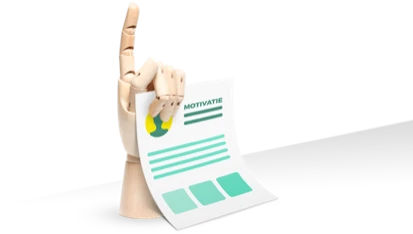Wo master - Gezondheid Eerder bekeken
Molecular Medicine and Innovative Treatment
Variant: Innovative Medicine

Over de opleiding Open dag: 13 maart

What you can expect at MMIT:
The MSc Molecular Medicine and Innovative Treatment (MMIT) offers a deep understanding of human disease mechanisms at the molecular, cellular, and systemic levels and equips you with the tools to translate this knowledge into therapeutic strategies.
* The unique advantage to combine fundamental, clinical and translational research
* To become part of a small, close-knit cohort where every student receives personal guidance to reach their personal and professional goals
* The opportunity to dive into a research topic you are excited about
* The ability to choose a specialization (although not a neccesity):
- Neuroscience
- Oncology
- Infection and Immunity
- Metabolic Diseases
- Systems Medicine
- Drugs and Devices
Want to learn more?
- Chat with our students!
- Reach us Via WhatsApp
Keuzes binnen de opleiding
-
The Erasmus Mundus programme International Master in Innovative Medicine (IMIM) is a two-year MSc curriculum of excellence that provides training in translational biomedical research. Its overall aim is to educate the next generation of outstanding translational scientists, entrepreneurs, and innovators, equipping them with the knowledge and skills to work effectively in different disciplines, sectors, and countries.
Jointly organizedIMIM is jointly organised by four universities: the University of Groningen (the Netherlands), Heidelberg University (Germany), the University of Tartu (Estonia) and Uppsala University (Sweden). IMIM students will benefit from extensive resources and experience in biomedical sciences offered by these institutions, as well as their networks in both academic and private sectors.
A Double DegreeIMIM is a double-degree programme, meaning that students who completed the required mobility programmes at the different European partner universities will receive degree certificates from both institutions.
InterdisciplinarityAlongside their courses and research projects, IMIM students will participate in Bench to Bedside and Beyond (BBB) projects throughout the four semesters, focusing on translational research and bringing science to society. This includes a multidisciplinary group project which is designed to foster students’ business and entrepren
Kennismaken met deze variant?
-
Are you interested in finding new and innovative drugs and therapies and do you wish to improve the use of existing drugs?
The disciplines covered in this track circle around the theme: 'molecules for patients'. You are encouraged to bridge the gap between the fundamental natural sciences (such as chemistry and physics) and the medical/clinical sciences in the field of medicinal products and technologies.
This specialization contributes to the entire field of the pharmaceutical and biomedical sciences, from basic areas like drug discovery, chemical analysis and synthesis to (clinical) pharmaceutical practice and patient-oriented research. Knowledge from different research disciplines is combined in the design and evaluation of optimal drugs, products and therapies that are being made available to society.
Research in this specialization is of high societal impact with several drugs or related products developed in-house on the market or in clinical trials, several spin-offs and companies, a strong portfolio of patents and research that contributes directly to healthcare policymaking.
For information and guidance on Drug Innovation research, please contact the Drug Innovation specialization coordinator Prof. dr. Hélder Almeida Santos at h.a.santos@umcg.nl.
Kennismaken met deze afstudeerrichting?
-
What are the detrimental and beneficial roles of microorganisms in human health and disease? How can we exploit this knowledge in the prevention and fight against infectious diseases?
What are the mechanisms that underlay or contribute to immune-mediated diseases? How can we exploit the immune system to treat (immune-mediated)diseases?
In this specialization, you can unravel the mechanisms underlying immune-mediated chronic diseases by translation of basic immunological concepts into clinical practice (and vice versa). You become involved in research contributing to personalized and precision medicine for infectious and immune-mediated diseases. You will be exposed to a wide variety of research topics ranging from the roles of microbes in the etiology of major autoimmune disorders, the genetics of celiac disease to targeting immune pathways for treatment .
For information and guidance on infection and immunity research, please contact the infection and immunity specialization coordinators prof. dr. Jan Maarten van Dijl at j.m.van.dijl01@umcg.nl or prof. dr. Peter Heeringa at p.heeringa@umcg.nl.
Kennismaken met deze afstudeerrichting?
-
Is every calorie the same? Does healthy obesity exist? Via which pathways does an unbalanced diet lead to diseases? What is the best nutrition during health and illness?
The prevalence of metabolic diseases, such as type 2 diabetes and non-alcoholic fatty liver disease, increases with age and is often associated with a sedentary lifestyle and excessive calorie intake. These diseases contribute significantly to liver, digestive, cardiovascular, and certain types of cancer (gut and liver). Given the global obesity epidemic, these diseases are responsible for most of the morbidity and mortality worldwide. In contrast, rare genetic metabolic disorders - of course! - do not have such a huge health impact, but they provide crucial insights into the molecular mechanisms underlying metabolic processes and aid in the development of new treatment strategies.
In this specialization you will focus on both basic and (pre)clinical translational research related to metabolic diseases. You will develop a strong understanding of the molecular basis of these diseases and receive training on how research, particularly in the basic sciences, can contribute to the development of evidence-based strategies for prevention, treatment, and management of metabolic diseases.
To learn more about the Metabolic Disease specialization within the UMCG and the Groningen Research Institute of Pharmacy (GRIP) a
Kennismaken met deze afstudeerrichting?
-
How do neurodevelopmental disorders arise and are they reversible? How is organismal or central nervous system ageing involved in neurodegenerative disorders?
In this specialization, you will be exposed to a range of topics in the field of neurobiology, ranging from fundamental neurobiology, basic research, to more (pre)clinical translational research. We aim to unravel the (epi)genetic basis of central nervous system (CNS) disease. The underlying cell biological defects in the context of various conditions and disorders will be addressed in in vitro models, animals and humans.
For detailed information on neuroscience-associated research, please go to the Department of Biomedical Sciences of Cells and Systems (in particular the sections Molecular Neuroscience and Molecular Cell Biology): https://bscs.umcg.nl/en/
For information and guidance on Neuroscience research, please contact the Neuroscience specialization coordinators dr. Bart Eggen at b.j.l.eggen@umcg.nl or dr. Susanne Kooistra at s.m.kooistra@umcg.nl.
Kennismaken met deze afstudeerrichting?
-
How do alterations in the genome, epigenome and/or metabolome drive cellular transformation? How is cellular and/or organismal ageing involved in cancer development?
In this specialization, you will focus on a range of aspects in the field of cancer biology, spanning the entire scope from rather fundamental basic research to (pre)clinical translational research and ultimately clinical trials. We aim to unravel the molecular mechanisms that determine malignant transformation of solid and hematological tumors and to translate these fundamental insights into improved early detection and treatment of cancer.
For information and guidance on Oncology research, please contact the Oncology specialization coordinator prof. dr. J.J.Schuringa at j.j.schuringa@umcg.nl.
Kennismaken met deze afstudeerrichting?
-
A central role for Systems Medicine methods in all biological and medical fields?
Computational methods are as diverse as the questions and problems which they tackle. In this specialization, the students gain an overview of a broad spectrum of computational methods and strategies, including top-down approaches to analyze and model genome scale data and bottom up approaches to study the detailed dynamics of molecular networks. In doing so we will cover multi-scale data across the genome, transcriptome, proteome, microbiome and metabolome. The needs and constraints for acquisition of quantitative data at all scales will be covered, as much as the differences in computational approaches used to analyze different data types.
For detailed information on bioinformatic and systems research and guidance on where to conduct your computational research of choice, contact the Medical Systems Biology and Bioinformatics specialization coordinator Prof. dr. Sebo Withoff (s.withoff@umcg.nl).
Kennismaken met deze afstudeerrichting?
- + Meer
Op Studiekeuze123 kun je informatie vergelijken. Op de website van de onderwijsinstelling kun je verder lezen als de opleiding je aanspreekt.
Bekijk instellingswebsiteBekostiging: Overheid
Studiepunten: 120 ECTS
Toelating & selectie € 2.694 wettelijk collegegeld in 2026 / 2027

Om toegelaten te worden tot een opleiding moet je aan bepaalde eisen voldoen.

Toelatingseisen
Om aan een master te kunnen starten, heb je een bachelordiploma nodig.
Sluit je bachelor niet direct aan op de master, of stroom je door van hbo naar wo? Dan moet je meestal een schakelprogramma of premaster volgen. Lees meer over schakelprogramma’s (Schakelprogramma, is dat nodig? - Studiekeuze123)
Collegegelden
Wettelijk collegegeld
Wettelijk collegegeld
Wettelijk of instellingscollegegeld?
Heb je recht op het wettelijk collegegeld of betaal je het instellingscollegegeld? Gebruik onze Collegegeldwijzer
Hoe hoog is het instellingscollegegeld? Bekijk het op de website van de universiteit
Meer weten?
Belangrijke data

Mis geen belangrijke gebeurtenissen. Check belangrijke data ook bij de opleiding zelf.

-
13
maart 2026
Open dag / avond
Meer open dagen -
1
mei 2026
Aanmelddeadline opleiding -
1
september 2026
Start opleiding
Alle startmomenten
Tijdens de opleiding 30 eerstejaars

Geen enkele opleiding is hetzelfde. Kijk daarom naar de kenmerken van een opleiding.

Studeren bij deze instelling
Studieadvies
We hebben onvoldoende betrouwbare informatie over dit onderwerp.
Studieverloop
Diploma binnen 3 jaar
Meer weten?
Tevredenheid 4.2/5.0 algemene tevredenheid

Hoe beoordelen de (oud)studenten deze opleiding?

Nationale Studenten Enquête
Hoe tevreden waren studenten in 2025 over aspecten van deze opleiding?
|
Studenttevredenheid
Meer informatie | 4.2 / 5 |
|---|---|
| Sfeer | 4.3 / 5 |
| Studiefaciliteiten | 4.3 / 5 |
| Studie opnieuw kiezen | 4.3 / 5 |
| Inhoud en opzet | 4.0 / 5 |
| Aansluiting beroepspraktijk | 4.1 / 5 |
|
Studenttevredenheid
Meer informatie | 4.2 / 5 |
| Sfeer | 4.3 / 5 |
| Studiefaciliteiten | 4.3 / 5 |
| Studie opnieuw kiezen | 4.3 / 5 |
| Inhoud en opzet | 4.0 / 5 |
| Aansluiting beroepspraktijk | 4.1 / 5 |
| Docenten | 4.1 / 5 |
| Lesstof in het Engels | 4.6 / 5 |
| Studiebegeleiding | 4.3 / 5 |
| Toetsing en beoordeling | 3.8 / 5 |
| Betrokkenheid en contact | 4.1 / 5 |
| Studiedruk |
Oordeel afgestudeerden
Over de studie Molecular Medicine and Innovative Treatment
Studeren met een ondersteuningsbehoefte
Veel studenten hebben tijdens hun studie behoefte aan extra voorzieningen of flexibiliteit in het onderwijs. Dit kan komen door een aandoening zoals dyslexie, een chronische ziekte, psychische klachten, maar ook topsport of ondernemerschap tijdens de studie. Studenten beoordeelden hoe tevreden ze zijn over de ondersteuningsmogelijkheden bij hun onderwijsinstelling.
Na afstuderen 90% van de werkenden vond een baan op niveau

Lees hoe het studenten van deze opleiding in de eerste periode na hun studie vergaat op de arbeidsmarkt.

Meest gekozen beroepen (na deze studie)
| Professoren en andere onderwijsgevenden in het hoger onderwijs | 28% |
| Apothekers | 25% |
Werkgelegenheid na deze studie
Bij deze studie zijn de verwachtingen voor het vinden van een baan zeer goed.
Een (substantiële) baan vinden...
duurt gemiddeld 3 maanden.32% krijgt een vast contract.
Match tussen studie en beroep
93% vond een baan binnen het vakgebied van de studie
90% vond een baan op het niveau van de studie
Startsalaris
Het startsalaris na deze studie is hoger dan het gemiddelde van alle wo master studies.
€ 3.377
Geschatte startsalaris na deze studie
€ 3.150
Geschat van alle wo master studies
Gemiddelde werkweek
Hoeveel uur afgestudeerden gemiddeld werken bij hun huidige baan.
38 uur
Het percentage zelfstandigen
We hebben onvoldoende betrouwbare informatie over dit onderwerp.
Contact Contact 050-3638100

Meer weten over de opleiding? Neem contact op met Rijksuniversiteit Groningen


Meer informatie
Bezoek ook de website van Rijksuniversiteit Groningen
Bezoek website van Rijksuniversiteit Groningen


